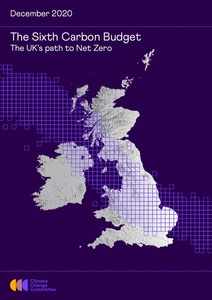The U.K. Climate Change Committee on Dec. 9 released its Sixth Carbon Budget, which provides guidance on the volume of greenhouse gas (GHG) emissions the U.K. can emit from 2033-2037 to achieve its net-zero goals.

According to the CCC, emissions must fall by almost 80 percent by 2035 when compared to 1990 levels in order for the U.K. to stay on track to meet its climate goals. The Sixth Carbon Budget spans more than 400 pages and identifies bioenergy with carbon capture and storage (BECCS) as one of the technologies needed to achieve net zero emissions.
Drax Group plc is already piloting a BECCS project at its wood pellet-fueled power station in the U.K. Will Gardiner, CEO of Drax, said the Sixth Carbon Budget reinforces the need for negative emissions to achieve the U.K.’s net zero goal. “The Government’s new 68 percent NDC commitment last week, alongside this report, reinforce how net zero will only be achievable through negative emissions and sustainable BECCS in the U.K., “ he said. “This world-leading technology can showcase the UK’s global leadership in the run up to COP26 in Glasgow next year.”
The U.K. Renewable Energy Association has also welcomed the CCC’s Sixth Carbon Budget. “The headline from the Sixth Carbon Budget will be the 78 percent reduction in GHG emissions being brought forward by 15 years and that this can be achieved whilst supporting green jobs growth and an economic recovery,” said Nina Skorupska, chief executive of the REA. “There are many additional and welcome elements within the report – the support for a range of bioenergy technologies and energy crops; the doubling of electricity generation which will all be low-carbon; and the restoration of peat landscapes and new woodland, are particular highlights.
“We do believe that more needs to be done with regards to the aviation sector and the heavy goods vehicle market for road transport,” she continued. “The plans to transition to low-carbon alternatives by 2050 and 2040, respectively, are too conservative to have a significant impact. We know that the Capex and Opex savings will balance out any short-term cost if there is the ambition to take action sooner.
“Nevertheless, this Carbon Budget does provide a basis from which the government can look to build their carbon reduction agenda,” Skorupska added. “If we start reducing emissions today rather than tomorrow, we will have a far greater chance of avoiding global temperature rises and tackling climate change.”







